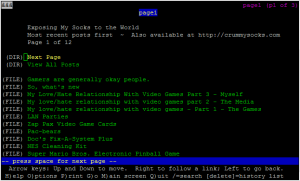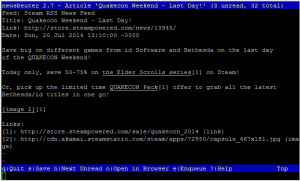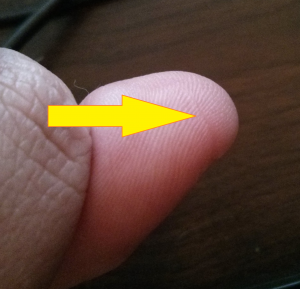A little bit over a year ago, I wrote about how I was going to the first actual LAN party that I had been to in several years. My intention was to write a followup to that article after the event, but I kind of got sidetracked and didn’t actually remember to do that until right now.
In the older piece, I expressed some concern that LAN Parties might be a relic of a time when broadband internet access was something that was nigh unattainable, and online gaming was tough to organize. Now that broadband internet access is (relatively) cheap and (relatively) ubiquitous, tearing your computer down, driving 100 miles, setting it back up, playing video games constantly while taking breaks to sleep in your car, a LAN Party just seems like a solution for a problem that no longer exists.
So, I took my four days off work, tore down the computer, packed it up and drove to Louisville, KY to see whatever became of the LAN party where I spent so many of my weekends during my college years. And to my surprise, I learned that almost nothing had changed. I don’t mean that in any good way. I’m just going to run down a few of my recollections from the event:
- There was a projector projecting mostly short videos on the wall with audio being piped over the house speakers. The videos being shown were mostly from the early 2000s, when I went last, with a few newish ones mixed in. One of the videos that got a lot of play was a kind of mean-spirited video where a young kid ran his mouth about his Unreal Tournament skills, and got ‘put in his place’ by one of the ‘pros’. I’m not going to link it here, but the footage from that video was recorded in March of 2002 and the video came about some time around that same time. We were reliving a moment of history that was only mildly interesting to a portion of the 200 people that attended 11 years prior. If any of those guys even attended, do any of them still think it’s funny?
- There were very few LAN games being played. I figured as much in the leadup article to this one, where I speculated that most gaming was moving toward MMORPGs and Free To Play titles that you played over the Internet. Even Diablo III did away with LAN play that was a huge part of its predecessors. You play games while connected to the server on the Internet at all times. Period. To curb piracy, or stop resales, or whatever reason you want to subscribe to. So I had to look around to see if I found any games that people were playing that I could join. And I found lots of DOTA, lots of LoL, lots of MMORPGs of several flavors, lots of Team Fortress 2, and not a lot not being played offline. But that’s not too bad, we had a connection to the Internet2 backbone, and speeds were good, until people started showing up. And anyway, I could always hop in IRC to see what people were talking about and shoot the breeze for a bit during downtime
- The IRC server was practically dead. I might be showing my age, but I spent a lot of time in college fooling around on IRC, or Internet Relay Chat for you whippersnappers out there. There were usually a few dozen people in IRC that were in the channels between games or taking a break or whatever, so you could talk about just about anything that you wanted: what was going on during a tournament, comment on the video playing, make requests for food or whatever you wanted. Basically, it was something to do that didn’t involve losing whatever game you were playing. Except that the IRC server was practically empty. There were a few people in there talking about what servers they had up on the network that were hosting games nobody was playing, or hosting files for trade (ahem), but very few actual people having very little conversation about just about anything. The biggest issue I saw was that some person was expressing some concern that there were naughty words in the chat, and that there were children present, so they shouldn’t be seeing that. The staff member poo-poohed these concerns by saying that the event was not and had never been family-friendly, and seemed to indicate that if parents had a problem with it, well maybe they shouldn’t have brought kids to the place in the first place, since it’s really not an event for them. I pointed out that not only were several of the attendants that had been coming for years old enough to have kids who, themselves, are old enough to come to the event now, but the organizer of the event, President LAN Party himself, had his kids in attendance, working the snack table. So, maybe considering making the event more family-friendly wouldn’t be an altogether bad thing. But that, of course, was not acceptable.
And so on, and so on. It turns out that I requested four days off of work and paid to attend for four days, but only stayed for about 36 hours. In those 36 hours, I played a lot of RIFT, I played a lot of Team Fortress 2 on the Internet, and I used the 100mb/100mb to download a lot of the titles in my Steam library that I had been putting off doing. I wanted to be able to say that the magic was still there, that the few hundred attendees that make the semiannual trek to keep the party going are keeping a piece of history alive. But what I found was a shell of a party. Going through the motions of the event that they’ve done a hundred times before. Every strand of cable is in place, and every mark is hit with expert timing. But the passion just isn’t there. The sense of community isn’t there. An event that needed to change with the times, but just didn’t. A time capsule that’s only been maintained in the very barest sense of the word that continues to exist just because it’s been going on this long, and maybe some people can’t imagine life without it (or they bought a lot of networking equipment that will go unused otherwise). Either way, I’m glad I went back to check on it. It reaffirmed that I may not have outgrown LAN Parties in general, but I’ve certainly grown away from this one.



